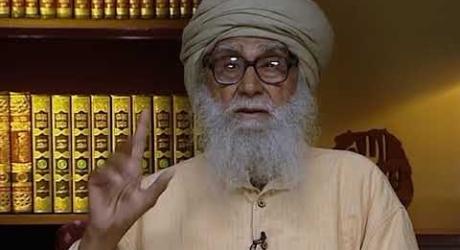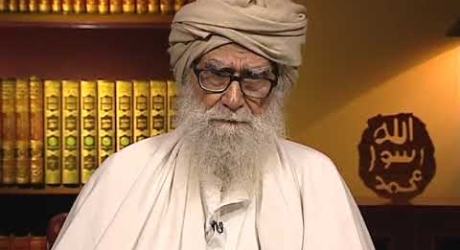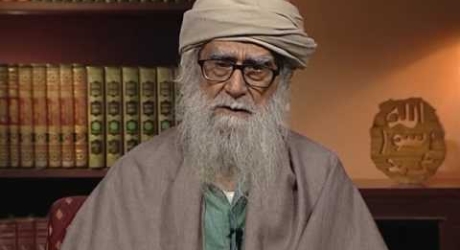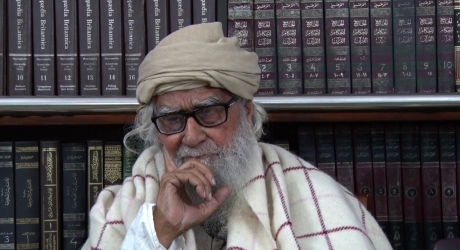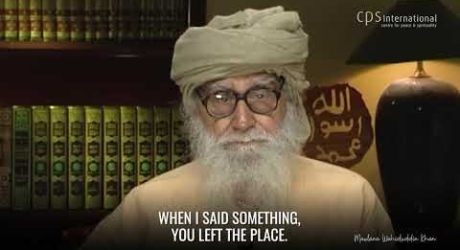Angels are loyal and obedient creatures of God, endowed with special powers and authority to facilitate the universe’s workings. The angels are invisible to human beings, but human beings are visible to them. They keep a watch over human beings on God’s behalf. These angels have the power to take a person’s soul at the time of death and bring that soul to God. The angels are facilitators of this present universe and the organisers of heaven and Hell in the Hereafter. These angels are countless. Satan does not have any power or authority over human beings. His method is a false adornment of deeds (The Quran, 15:39). That is, adorning evil deeds so that they appear good. Satan uses this same method constantly to make man follow his path. Whenever justice calls for a person to ‘bow down to another, when truth demands one to accept the other’s contention, Satan appears and begins instigating and influencing the person to follow his method instead of the angelic method. So that instead of ‘bowing down’, he spurns and rejects the other. All the evils of human society, within the family or outside of it, begin with a grievance. A person gets angered over a matter that displeases him. In every such situation, there is a choice between pure truth on the one hand and the demands of egotism and injustice on the other. Man, however, chooses to ignore the call of truth and becomes an enemy to his brother. At the beginning of creation, God demonstrated two different characters as examples for humanity. One, a satanic character and the other, an angelic character. All of Satan’s efforts are towards this goal of making man follow him, but man must resist all temptations and strive to acquire the character of the angels.
Introduction
Man lives amidst two unseen forces – Satan and Angels. He chooses to follow the guidance of one of these forces and this choice decides whether he has opted for the path of success or failure. Innately, man has two chief characteristics that govern his thoughts and actions and lead him to choose the company of either the angels or satan. These intrinsic attributes of man are:
1. Nafs-e-lawama or Conscience, which serves as the entry point of angels
2. Nafs-e-ammara or Ego, which serves as the entry point of Satan
Man therefore needs to remain forever cognizant of the attribute he uses the most – his conscience or his ego. To be influenced by Satanic thoughts man does not have to make a conscious effort because Satan is anyway watchful of every opportunity that man may provide him. However to attain the angelic succour, it is imperative that man makes conscious effort.
Examples from the life of Prophet Muhammad
Four thousand years ago, Prophet Abraham built Kaaba (Baitullah) as a centre of worship of One God. It remained so for some time but as generations passed and a decline crept into the practices of men, they started worshipping idols. This continued for years and by the time Prophet Muhammad came about, Kaaba housed almost 360 idols. In other words, Darul-Tauheed (House of Monotheism) was turned into Darul–Asnam (House of Idolatory).
Prophet Muhammad did not react against the situation. This behaviour is exactly opposite to what the Muslims did when idols were unearthed from the Babri mosque premises. The response given by the Prophet was a well-considered one, on the lines of the following Quranic injunction:
Purify your garments (thought process) (Quran, 74:4)
Revealed in times when idolatory dominated Arabia, Quran did not ordain the Prophet to cleanse the Kaaba of the idols. Instead, its only focus was on addressing the hearts and minds of people. This is a clear example of a conscious response.
Man chooses his counsel
According to a Hadith,
To proceed unhurriedly (al-ta-anni) is the way of God and to act hurriedly (al-ajala)
is the way of Satan. (Tirmidhi)
Man can respond to a situation either impulsively or deliberately. When man responds at the spur of the moment, he chooses Satan as his counsel and when he reacts unhurriedly, man chooses to be guided by angles. An example of satanic behaviour is the practice of giving divorce by uttering ‘talaq’ thrice. Such a response is driven by anger and is entirely unislamic. Our response serves as the entry point for either angels or Satan. This entry point cannot be locked with any lock and this is the real test. If it closes, the test will no longer remain.
God created the world and gave freedom to every person. With freedom, comes the right to misuse the freedom. The unwanted situations that man faces in life are not an act of oppression but the result of misuse of freedom. This law of nature holds true for all men. Yahya was a Prophet of God yet people killed him because they misused their God-given freedom. Referring to this act as “oppression” is tantamount to blaming God and casting aspersions upon His Creation Plan.
Patience is a great virtue in Islam because it amounts to being in agreement with the planning of God. Citing its importance the Quran says,
God is well pleased with them and they are well pleased with Him. (98:8)
It means that man must agree to the Creation Plan of God under all circumstances. Those who do not do so will not get entry into paradise.
Muslims worldwide have become a Protestant Community
Muslims worldwide, have become a Protestant community. In the light of conscious thought, all these protests appear to be directed against God because these protests are equivalent to questioning why God gave freedom to people. God will never revoke the freedom He gave to man because that is a pre-requisite for test. Instead of fretting, man must learn to give the correct response in such situations. Man must give a considered response to situations because only cool-headed thinking can lead to a positive outcome.
Policy of Avoidance
Mecca was the home town of Prophet Muhammad. But Quraysh boycotted Prophet Muhammad so severely that he and his family had to leave the city of Mecca. These were very tough times because devoid of anything to eat, they thrived on roots of plants. It was so difficult a time that Prophet’s wife Khadijah passed away because of the hardships.
When the Quraysh thought it impossible to control the influence of the Prophet Muhammad, they decided to kill him. When his Companions got to know about the devious plot of their opponents, they advised the Prophet to wage a war against the Quraysh. Declining this suggestion the Prophet remarked,
"I have not been asked to wage a war." (Sirah Ibn Hisham)
As per their plot, the opponents of the Prophet assembled outside his house. These men possessed such high character that despite having arrived to harm the Prophet, they did not enter the house without seeking permission. Meanwhile, the Prophet Muhammad left his house from the back door and left for Medina. The Prophet could have opted to fight (ajala) considering his opponents had arrived till his doorstep, yet he chose not to and migrated to Medina. Upon realizing that opportunities no longer existed at Mecca, Prophet Muhammad changed his workplace. This was an example of the principle of avoidance which saved the Prophet from the result of a hasty or emotional response to the situation.
This is the major difference in the approach of angels and Satan. While Satan awakens the ego and counsels to retaliate so that the enemy may perish, the main concern of the angels is the result-orientedness of an endeavour. The policy of avoidance followed by the Prophet allowed the dawah work to continue unhindered.
Even after he migrated to Medina, the Quraysh kept launching offensives against the Prophet and his Companions. But on most occasions the Prophet evaded the encounter. For example, once Prophet Muhammad got to know that his opponents were approaching them in battle formations. He consulted his Companions seeking suggestions to evade the battle. One of his Companions, Salman Farsi had worked for the Persians. He suggested that the Persian kings used to dig up a trench in order to avoid a battle. Such a trench would act like a buffer between the two sides.
Prophet Muhammad liked the suggestion and decided to use this technique. The Companions dedicatedly involved themselves in digging the trench. By the time, the Quraysh reached Medina, the trench was ready and the army had to consequently halt. They stayed there for sometime and returned threafter. (Sirah Ibn Hisham)
According to a tradition, a man started hurling abuses at Abu Bakr while he sat with the Prophet Muhammad. Till such time that Abu Bakr sat quietly, the Prophet kept sitting but when after a long time Abu Bakr replied to one of the allegations, Prophet Muhammad quietly got up and went away from that place. Abu Bakr later asked why the Prophet went away. Prophet Muhammad said that when he (Abu Bakr) was quiet, angels were there. The moment he retorted, the angels went away and so did I.
(Al-Bukhari)
This example illustrates that if man fails to exercise patience, he would succumb to the promptings of Satan. The reason for the pathetic state of Muslims is their lack of restraint.
According to another tradition, a war was fought with the Iranians at the time of the second caliph, Umar. The Iranian forces were finding it difficult to defend themselves and so the king – Yazdegerd and his general Rustam decided to negotiate a truce. Asim bin Amr was selected to represent the Caliph at the negotiations. As he reached the Court, King’s soldiers asked Asim to leave the horse behind and proceed on foot. But he did not agree and took his horse inside the Court. The King took it as an insult when Asim rode inside against the protocol of the Court and did not extend any curtsies. The King did not speak with him and instead ordered for a pot of earthen mud to be kept on his head following which he was asked to leave. This was a humiliating gesture but Asim did not react. He placed the pot on his head and returned. As he reached, his commanding General Saad was sitting in his tent. Asim placed the pot before Saad who was overjoyed as he saw it. He happily remarked,
This is a good omen. God has given us the keys to their sovereignty.
(Al-bidaya wan-nihaya)
Their positivity enabled the Companions of the Prophet to view the situation in an entirely different light. They interpreted it to mean that the King himself handed over a part of his kingdom (the soil of his land) to them. Such a response became possible because the envoy exercised patience in the Court and did not react despite being debased. Any reaction would have led to his execution and history would have remained unaware of such a powerful example of positivity.
The Importance of Patience
The following tradition highlights the importance of patience. According to it:
With patience (sabr), comes the help of God. (Musnad Ahmad)
Exercising patience brings to fore the miracle of angelic counsel. Had the envoy reacted, the King would have put him to death and that would have been his end. But the patient behaviour paid as it made them a truly positive personality.
Patience was the chief characteristic of the Companions of Prophet Muhammad. They remained cool-headed and did not act impulsively. Contrary to this, the decline in the present-day Muslims has led to them to an abyss where they are not receiving angelic guidance.
During the Abbasid era, the Tartaris attacked the Muslims. They demolished several mosques and killed many people in the area starting from Samrakand to Halab, Syria (details in ‘Spread of Islam’ by Professor Arnold). One day, a Tartari prince set out on a hunting excursion. On his way, he encountered a Muslim alim, Sheikh Jamaluddin. His presence infuriated the prince so much that in order to demean him, the prince asked Sheikh: “Who’s better – My dog or you?”
This was a very provocative statement but Sheikh calmly replied:
"If I die upon my faith (imaanbillah), I am better or else your dog is."
This sentence shook the prince. He grew curious to know about this faith, presence of which raises the stature of man and absence of which casts him into an abyss. Later, the prince invited the alim and was so deeply influenced that he embraced Islam.
Conclusion
Each one of us lives between two unseen forces – Satan and angel. There is no exception to this rule. Our personality has an entry point for both of them - one being the ‘ego’ and the other being the ‘conscience.’
It is imperative to bear in mind that unhurried response is the secret of success in this life and the hereafter. Such a response entails deep thinking. A hurried response succumbs man to Satanic promptings and becomes the cause of fights and clashes.
Success, must be remembered can come only by treading the path of angels!





